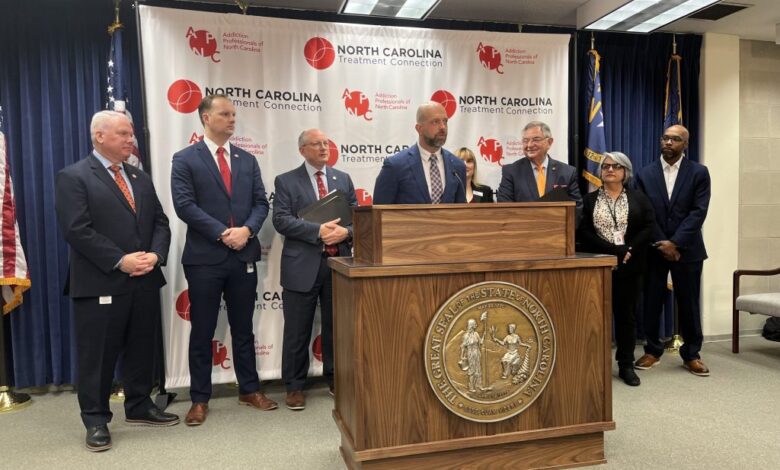Patient brokers prey on those struggling with addiction; new campaign works to stop them


By Grace Vitaglione
Michael Roberts went to treatment for substance use disorder 26 times. The Asheville native, who is now the director of outreach at Addiction Professionals of North Carolina, said he’s alive today because he eventually found “the right help.”
Though there are good treatment recovery programs in the state, he said, there are also bad actors who try to profit off of those who are struggling with addiction.
Roberts spoke at a news conference hosted by North Carolina House Rep. Tim Reeder (R-Ayden) on Feb. 12 about the dangers of patient brokering — when someone is paid “kickbacks” for recruiting patients to a certain treatment facility and/or sober living home.
“When someone is at their lowest and they’re willing to do anything to get better, that’s when we’re our most vulnerable, and that’s when the worst actors step in,” Roberts said.
He saw this practice firsthand while working at a halfway house. A broker offered residents $500 for drugs if they would then stay in a one particular treatment center for at least 21 days, after which the treatment center would give the broker a kickback from the insurance money. The broker would also promise to give the patient a cut when they discharge.
This often turned into a cycle, Roberts said, encouraging someone to misuse substances until they died.
North Carolina made patient brokering a felony with the Stop Addiction Fraud Ethics Act of 2023. Addiction Professionals of North Carolina, a trade association and advocacy organization for substance use professionals and providers, launched the NC Treatment Connection campaign Feb. 12 to raise awareness about the issue of patient brokering and support enforcement of the law.
The campaign also aims to make it easier for people to access ethical, evidence-based treatment options within the state.
“It’s one thing to pass legislation…it’s another to make sure we enforce it and it does good work. So this is the first step,” said Sara Howe, CEO of APNC.
Patient brokering in N.C.
Patient brokering, sometimes called body brokering, can take several forms, according to the Dayspring Foundation — formerly the Eleanor Health Foundation — which supports addressing the social determinants of health within the recovery ecosystem.
Brokers may get paid for referring patients to a treatment facility and/or incentivize them with money or food to stay in or switch addiction treatment facilities. Brokers may also commit insurance fraud, like billing insurance excessively for unnecessary treatment, according to the foundation. Treatment facilities and providers may also misrepresent their services or their accreditation status.
In a 2023 study in the BMC Health Services Research journal, researchers interviewed treatment professionals and people with opioid use disorder about patient brokering. Survey participants reported that patient brokers would pay for plane tickets and offer money to attract individuals to treatment, then skim off the balance of insurance payments.
Many of the study participants linked patient brokering to increased overdose deaths, as brokers provided drugs and promoted relapse, the article said. This created “a revolving door of treatment, which compounds the overdose risk after periods of abstinence,” according to the study.
About 12 North Carolinians died of overdose every day in 2022, according to data from the state Department of Health and Human Services. The death rate from overdoses has dropped recently, but there’s limited understanding of the decline.
Howe said it’s hard to quantify how widespread patient brokering is in North Carolina, because the brokers often act underground, but it was a big enough problem that the legislature passed a law about it.
“[Brokers] pop up a little bit like Whack-a-Mole,” she said. “With campaigns like this, we’re also going to bring them out of the woodwork as we educate people on what is good treatment and what is an ethical provider.”
Enforcing the law
Before the passage of the SAFE Act, it was harder to prosecute patient brokers, Roberts said.
“It was on us in the recovery community to look out for one another,” he said.
Federal law made patient brokering a crime in 2018. But there are few prosecutions under that law, according to a 2024 blog post by Jeffrey Welty, a public law and government professor in the UNC Chapel Hill School of Government. He said that may be because victims of patient brokering don’t see themselves as victims or are reluctant to report the crime.
Addiction Professionals of North Carolina is working with the N.C. Department of Justice to start investigations into patient brokering, Howe said. DOJ is partnering with law enforcement, prosecutors and public health officials to address the issue, a spokesperson said.
Rep. Allen Chesser (R-Middlesex) talked at the conference about how addiction caused a death in his family, and he said the campaign aims to remove the stigma around addiction that causes people to think they deserve poor treatment.
“From the top down, we’re letting them know we see you. You deserve recovery, not poor treatment, and that’s the difference of what we’re trying to do here,” he said.
Howe said family members and friends of those in recovery are often the “first line of defense,” and they can go to local law enforcement agencies to report their suspicions about patient brokering. Sometimes, though, it’s too late.
“I knew a young woman whose mother had to be told by somebody else in a facility that she had been trafficked out of, that she had passed,” Howe said. “Her insurance company paid $1.2 million for that bad facility, because they’re also scamming the insurance system at the same time.”
The state law requires that treatment providers and facilities be truthful in their advertising and marketing materials, and that they disclose any financial relationships between the residence, provider site or facility and any publisher of marketing or advertising.
Howe said that can be as simple as having the correct address on the organization’s website.
Welty’s blog post pointed out that the law’s text may create some uncertainties around what kind of marketing is legitimate. If a recovery facility works with a third party, there’s a risk their conduct could be viewed as patient brokering, he said.
Connecting people to evidence-based treatment
Besides addressing bad actors, connecting people to the right services is crucial, Howe said. Part of the campaign involves partnering with the N.C. Department of Health and Human Services and the Alcohol/Drug Council of N.C. — which both have resource directories of providers — to improve access to ethical, evidence-based treatment.
Howe said it’s also important for people to realize they don’t need to go out of state for treatment; there are plenty of good programs in North Carolina.
Sen. Jim Burgin (R-Angier) said at the conference Feb. 12 that there should be a rating system for substance use disorder treatment centers just as there is a star system for child care centers. He also expressed support for connecting people with ethical, evidence-based treatment.
Reeder said as an emergency medicine physician, he’s seen firsthand the “terrible consequences” that addiction has for his patients.
“Addiction is not a moral failing. It’s not a choice. It’s a medical condition that requires the right care,” he said.
The legislature appropriated $200,000 of opioid settlement funds to APNC to launch this campaign in the 2023 budget. While counties are restricted to only spending their portion of the funds on evidence-based interventions, lawmakers are not as constrained.
The legislature previously appropriated some of their allotment to abstinence-based programs and/or programs that do not allow the use of medication for opioid use disorder, which has come to be considered the “gold standard” for treatment by addiction medicine experts.
Reeder said at the Legislative Breakfast on Mental Health on Feb. 8 that the state should evaluate the programs they fund after the fact to make sure the promised outcomes are actually happening.
That may come at the cost of some lawmakers’ pet programs — “but we need to be intellectually honest with ourselves,” Reeder said. A program that calls itself “evidence-based” should actually follow the model of the evidence they’re citing.
“We don’t have an unlimited amount of funding, so the money that we spend has to be efficient and effective, and if it’s not going to do that, then we ought not to be doing so,” he said.
The post Patient brokers prey on those struggling with addiction; new campaign works to stop them appeared first on North Carolina Health News.




